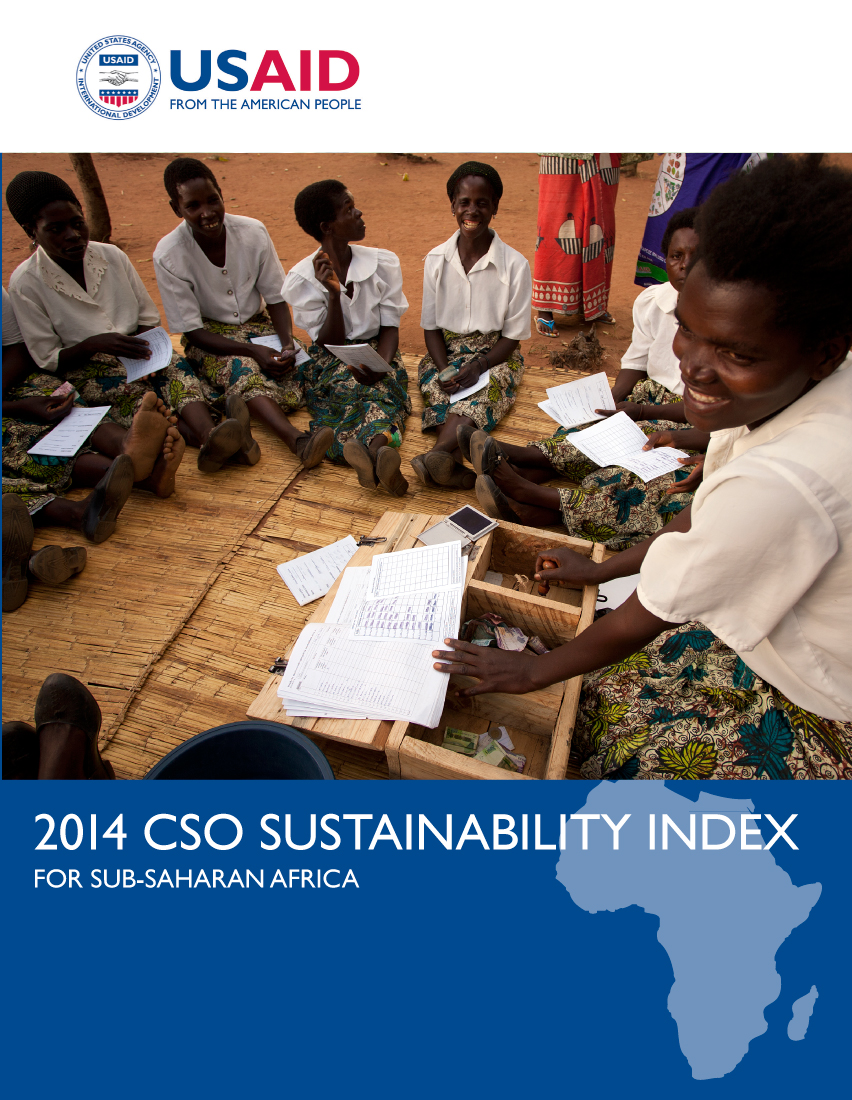- What We Do
- Agriculture and Food Security
- Democracy, Human Rights and Governance
- Democracy, Human Rights and Governance Strategy
- Supporting Free and Fair Elections
- Supporting Vibrant Civil Society & Independent Media
- Protecting Human Rights
- Promoting Accountability & Transparency
- Importance of Democracy, Human Rights, & Governance to Development
- Countering Trafficking in Persons
- Economic Growth and Trade
- Education
- Ending Extreme Poverty
- Environment and Global Climate Change
- Gender Equality and Women's Empowerment
- Global Health
- Water and Sanitation
- Working in Crises and Conflict
- U.S. Global Development Lab
BACKGROUND
2014 CSO Sustainability Index for Sub-Saharan Africa ![]() (pdf - 4 MB)
(pdf - 4 MB)
The Civil Society Organization Sustainability Index (CSOSI) has been used by USAID since 1997 to assess the sustainability of the CSO sector in 29 countries in Europe and Eurasia. The CSOSI was first applied in sub-Saharan Africa in 2009. In 2011, the CSOSI tool was further applied to seven countries in the Middle East as well as Afghanistan and Pakistan. The Aga Khan Foundation funds CSOSI in the latter two countries as well as in two countries in sub-Saharan Africa. By using standard indicators and collecting data each year, the CSOSI allows users of the tool to track developments and identify trends in the CSO sector over time while allowing for cross-country and cross-region comparison. It is used by CSO advocates, other development partners, and academics to assess international and regional trends in the civil society sector and to identify common obstacles impeding the sector’s sustainability, such as the legal environment, organizational capacity, and financial viability.
APPROACH
The Index measures the sustainability of each country’s CSO sector based on the CSOSI’s seven dimensions: legal environment, organizational capacity, financial viability, advocacy, service provision, infrastructure, and public image. The CSOSI’s CSO implementing partners in each country lead the process of organizing and convening a diverse and representative panel of CSO experts. Country panels discuss the seven dimensions for the year being assessed, and reach consensus on the scores corresponding to each dimension. These scores are then averaged for an overall score of the sustainability of each country’s CSO sector. The scores are organized into three basic categories representing the level of development of the civil society sector: Sustainability Impeded; Sustainability Evolving; Sustainability Evolving. All scores and narratives are then reviewed by a Washington-based editorial committee, assisted by sub-regional civil society experts. With the information provided by the expert panels along with desk research, the CSO implementing partners then develop a narrative report.
FINDINGS
The 2014 CSO Sustainability Index demonstrates that CSOs in Sub-Saharan Africa are growing in their role as critical responders to emerging national issues and needs, through advocacy initiatives and provision of needed services. It also highlights some of the continued areas of weakness that impede long-term sustainability. Notably, in many countries in the region, CSOs—particularly those focused on advocacy and human rights— are facing increasing restrictions or threats of restrictions on their work. In addition, even the most sustainable CSO sectors continue to lack access to critical technical and financial resources, thereby undermining growth in most other dimensions of sustainability. As in 2012, ten of the twenty-five countries were in the Sustainability Impeded category. The other fifteen countries remained in Sustainability Evolving.








Comment
Make a general inquiry or suggest an improvement.